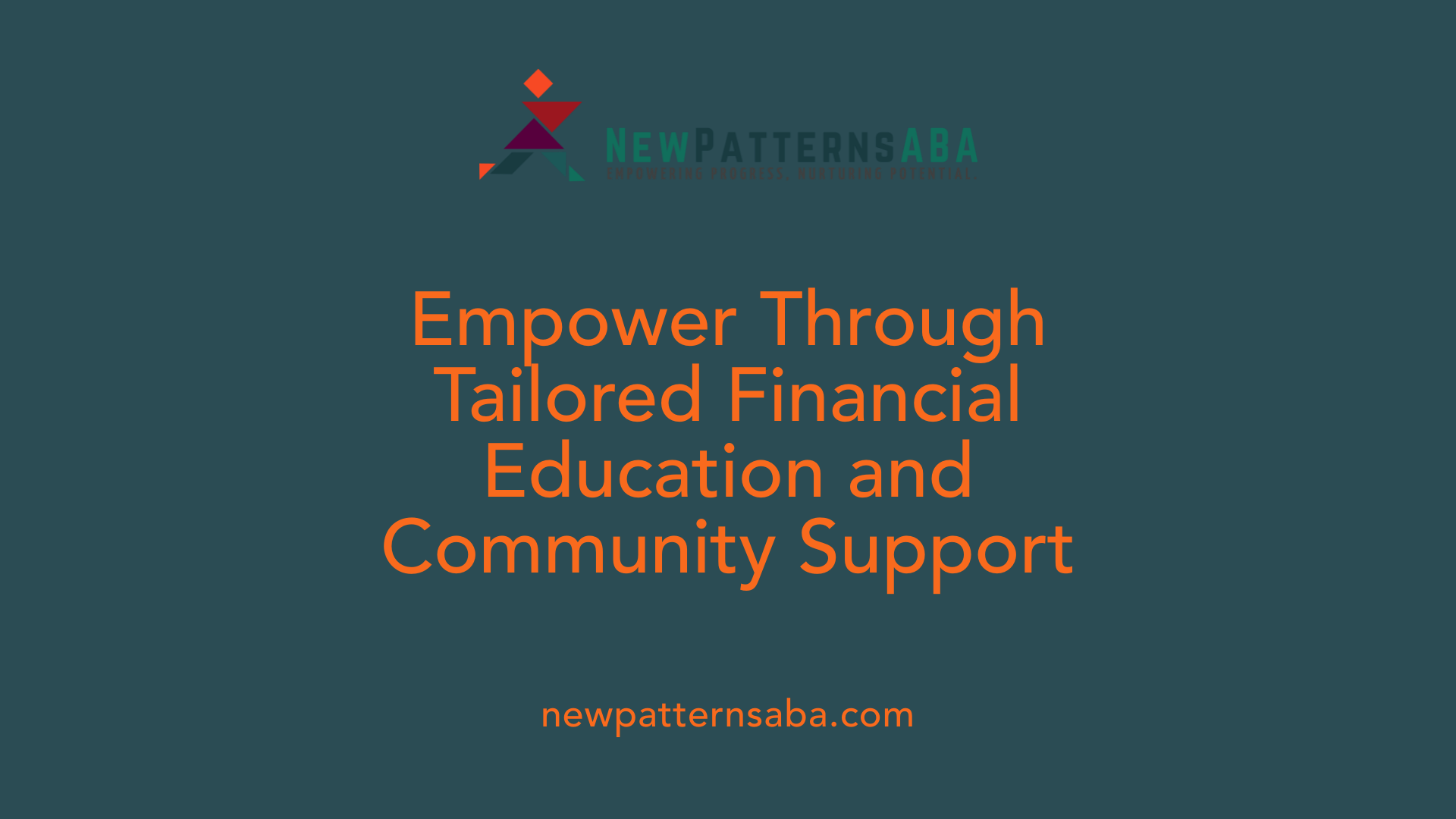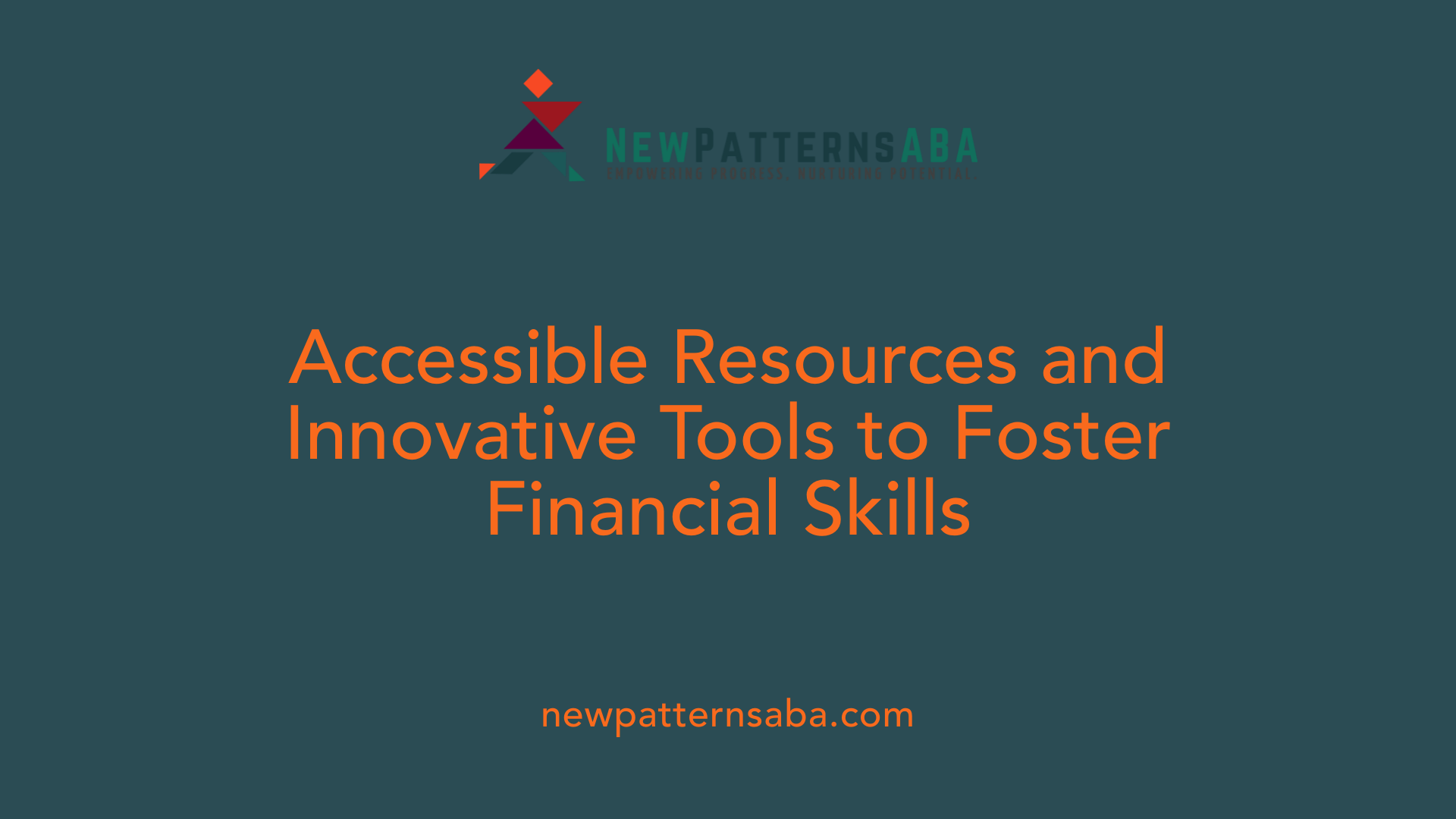The Importance of Tailored Financial Education for Autistic Adults
Financial literacy is a vital component of independence for autistic adults. As many face unique challenges related to communication, social interaction, and executive functioning, developing effective, accessible strategies for teaching money management is essential. This article explores comprehensive approaches, resources, and legal protections to help autistic individuals achieve financial stability and confidence.
Core Topics in Teaching Financial Literacy to Autistic Adults

What topics should be covered when teaching financial literacy to autistic adults?
Teaching financial literacy to autistic adults involves a comprehensive approach that addresses both practical skills and understanding of important legal and financial concepts. It’s vital to start with basic topics like budgeting, banking basics, and saving strategies.
For budgeting, visual aids and online apps such as Mint, YNAB, and PocketGuard are effective tools. These help individuals track expenses, plan spending, and develop routines to avoid overdraft or debt. Creating a visual budget at home with simple steps builds familiarity and confidence.
Banking essentials include understanding how to open and access accounts at sensory-friendly or online banks, which are often designed to accommodate sensory needs and reduce anxiety. Using debit cards responsibly is an important skill, helping avoid debt. It’s also crucial to educate about credit cards—using them cautiously and setting reminders for payments.
Saving strategies should encourage early savings, with tools such as ABLE accounts, which allow individuals to save for future needs without risking their public benefits like SSI and Medicaid. Building savings promotes financial security and prepares for unexpected expenses.
Public benefits like Medicaid and SSI play a key role in financial stability. Navigating these benefits can be complex, but community organizations, including Autism Speaks and local agencies, offer support and guidance.
Long-term planning tools, such as establishing Special Needs Trusts and preparing or updating wills, ensure ongoing financial security. ABLE accounts are particularly useful for saving without affecting eligibility for public benefits.
Legal tools like Powers of Attorney and guardianship are essential for managing decision-making responsibility. Education about these options helps families and individuals make choices that best support independence.
Fostering responsible credit use involves understanding how to build a credit history through bill payments and avoiding high-interest loans or payday loans. Using credit wisely can provide financial flexibility.
Online banking and financial technology are integral to modern money management. Autistic adults should learn how to navigate online platforms, utilize alerts, and secure their digital accounts.
Future investment and estate planning include creating or updating trusts, exploring investment options, and making arrangements for long-term care and asset transfer. Early engagement with these planning steps safeguards future stability.
Finally, community resources and support networks, such as local workshops and programs run by organizations like Autism Speaks, provide ongoing education, advocacy, and assistance. Access to these resources enhances independent living skills and promotes financial empowerment.
| Topic | Key Skills | Additional Resources |
|---|---|---|
| Budgeting | Visual aids, apps, routines | Mint, EveryDollar |
| Banking | Account setup, online banking | Sensory-friendly banks |
| Saving | ABLE accounts, emergency fund | Local financial advisors |
| Public Benefits | Navigating SSI, Medicaid | Community agencies |
| Legal Planning | Wills, Trusts, Powers of Attorney | Special needs legal professionals |
| Responsible Credit Use | Building good credit, managing debt | Credit Karma |
| Technology | Secure online banking, alerts | Money management apps |
| Future Planning | Estate, trusts, investments | Financial planners |
| Community Support | Workshops, advocacy, guidance | Autism Speaks, local groups |
Overall, teaching these interconnected topics with patience and tailored supports helps autistic adults gain independence and confidence in managing their finances effectively. Integrating practical training with legal and community resources creates a well-rounded foundation for long-term financial well-being.
Supporting Autistic Adults in Achieving Financial Independence

How can caregivers and practitioners support autistic adults in gaining financial independence?
Supporting autistic adults in becoming financially independent requires a comprehensive, tailored approach. From an early age, it’s important to introduce practical financial skills through education focused on their individual abilities. Using visual aids—such as picture-based budgets and visual supports—can make complex concepts like saving and spending easier to understand.
Technology plays a vital role in modern financial management. Budgeting apps like Mint, YNAB (You Need A Budget), PocketGuard, and others—such as EveryDollar, GoodBudget, and Wally—are useful tools that help track expenses, automate payments, and foster better money management habits. These tools often incorporate visual aids, making them especially suitable for autistic users. Automating savings through apps and setting reminders for bill payments helps in building routine and reducing anxiety related to financial tasks.
Community resources are invaluable for autistic adults to access benefits and specialized training. Programs that offer guidance on navigating Medicaid, SSI, social security, and state-specific Medicaid Waivers can ensure they receive the support they need. Transition programs, often integrated into high school or community agencies, focus on developing independent living skills including money management.
Legal financial tools like trusts, including Special Needs Trusts, and legal designations such as Durable Powers of Attorney, provide long-term financial security. These legal arrangements protect assets and clarify financial responsibility, helping to maintain benefits like SSI and Medicaid without risking asset depletion.
Creating ASD-friendly banking environments is essential for reducing anxiety and facilitating access. Sensory-friendly bank branches—designing quiet, comfortable spaces—can encourage more autistic adults to use in-person banking services. For those who prefer or require it, online banking offers a safe, accessible alternative.
Real-world practice is crucial. Encouraging autistic adults to handle actual transactions, such as paying bills, grocery shopping, or managing allowances, helps develop confidence and independence. Parents and caregivers can facilitate these activities gradually, providing mentorship without overstepping.
Supporting goal-setting and ongoing motivation also enhances confidence. Setting achievable financial targets, such as saving for a desired item or reducing spending on unnecessary purchases, helps build a sense of accomplishment. Regular check-ins and positive reinforcement foster continued engagement and skill development.
By combining education, technology, community support, legal safeguards, sensory accommodations, and practical experiences, caregivers and practitioners can help autistic adults gain the skills and confidence needed to manage their finances effectively and achieve independence.
Legal Protections and Rights for Autistic Adults

What are the financial rights and protections available to autistic adults?
Autistic adults are protected under several laws that ensure they are not discriminated against when it comes to financial services and opportunities. The Americans with Disabilities Act (ADA) and Section 504 of the Rehabilitation Act are cornerstone legislation that prohibit discrimination based on disability in employment, housing, healthcare, and public accommodations. These laws require banks, financial institutions, and service providers to make reasonable adjustments, ensuring that autistic adults have fair access to essential services.
Beyond anti-discrimination laws, many autistic adults qualify for income support through government programs like Social Security Disability Insurance (SSDI) and Supplemental Security Income (SSI). These programs provide financial assistance to support basic living needs. Additionally, Medicaid offers healthcare coverage, and specific Medicaid Waivers for autism help fund community-based services. These supports are vital for maintaining financial stability and independence.
Legal tools also play a crucial role in managing finances while safeguarding autonomy. Supported decision-making options allow adults to make their own financial choices with appropriate support, rather than through guardianship. Legal instruments such as Special Needs Trusts provide a way to protect assets and ensure funds are used for essential needs without jeopardizing public benefits.
Powers of attorney, especially durable powers of attorney, enable trusted individuals to handle financial transactions and decision-making if the autistic adult cannot manage these themselves temporarily or permanently. Guardianship is an additional legal structure but is often considered a last resort, with less restrictive alternatives preferred to maintain independence.
For long-term savings and to cover specific disability-related expenses, ABLE accounts are available. These tax-advantaged savings accounts help individuals set aside money without risking their eligibility for public benefits like SSI and Medicaid.
Overall, these laws and protections are designed to promote fair treatment, financial security, and civil rights for autistic adults. They help ensure that individuals can access necessary resources, participate fully in society, and maintain their independence.
| Legal Protections | Description | Supporting Legislation | Additional Notes |
|---|---|---|---|
| Anti-discrimination laws | Protect against discrimination in financial and public services | ADA, Rehabilitation Act | Require reasonable accommodations |
| Government benefits | Provide financial and healthcare support | SSI, SSDI, Medicaid | Includes autism-specific waivers |
| Supported decision-making | Promotes autonomy in financial decisions | Supported decision-making laws | Alternatives to guardianship |
| Legal tools for managing finances | Help protect assets and make decisions | Trusts, POA, guardianship | Customizable based on individual needs |
| Tax-advantaged savings | Help set aside funds for disability expenses | ABLE accounts | Do not affect benefit eligibility |
This comprehensive legal framework aims to support autistic adults in achieving financial stability, protecting their rights, and fostering independence.
Enhancing Financial Literacy Through Awareness and Education

How can raising awareness about financial literacy tailored to autistic adults improve their financial stability?
Raising awareness about financial literacy specifically designed for autistic adults plays a vital role in enhancing their financial stability. When educational programs account for the unique learning styles and challenges faced by autistic individuals, they can deliver more effective and accessible information.
One of the main benefits of tailored curricula is that they help individuals understand fundamental concepts such as budgeting, saving, and responsible borrowing. These concepts are often challenging without clear guidance, and customized approaches can make learning less overwhelming.
Accessible educational strategies, including visual supports, hands-on activities, and real-life scenarios, facilitate better comprehension. For example, using visual aids and online tools like Mint, YNAB, or PocketGuard can simplify expense tracking and budgeting.
Community-led programs and workshops further reinforce learning by creating a supportive environment where autistic adults can practice skills and ask questions. These programs often involve peer support, which boosts confidence and fosters a sense of belonging.
Incorporating multimedia and interactive simulations makes the learning process engaging and memorable. Apps, videos, and online courses tailored for autistic learners can teach complex financial concepts in an understandable manner.
Fostering confidence and independence through education enables autistic adults to make informed decisions about their money. As they gain knowledge, they are better equipped to manage expenses, avoid debt, and save for future needs.
Awareness campaigns targeting families, caregivers, and financial institutions also help promote understanding and inclusion. When banks and service providers implement autism-friendly policies, such as sensory-friendly banking spaces and accessible financial products, the overall support system improves.
Ultimately, promoting targeted financial education and awareness leads to better economic outcomes for autistic adults. It reduces anxiety associated with financial tasks and empowers them to take control of their financial lives, increasing their independence and long-term stability.
| Strategy | Description | Benefits |
|---|---|---|
| Tailored Curriculum Development | Creating learning materials customized to autistic adults’ needs | Enhances understanding, reduces frustration |
| Accessible Educational Strategies | Using visual tools, hands-on methods, and real-life scenarios | Facilitates memorability, builds practical skills |
| Community-Led Programs | Workshops facilitated by local organizations and peer groups | Provides social support, reinforces learning |
| Multimedia and Simulations | Videos, apps, and online modules for interactive learning | Engages learners, improves retention |
| Fostering Confidence and Independence | Gradual responsibility and positive reinforcement | Promotes self-efficacy and financial self-sufficiency |
Resources and online platforms can offer additional support and guided practice. For example, programs like 'Money Management for Young Adults with Autism' from Autism Speaks and 'Preparing Autistic Teens for Adulthood: Money Management' by RDIConnect provide tailored activities and practical tips.
In summary, raising awareness and implementing customized educational strategies foster a supportive environment where autistic adults can build essential money management skills. These efforts contribute to their financial stability, independence, and overall well-being, paving the way for a more inclusive and equitable society.
Resources and Tools for Financial Development in Autism

What educational resources and tools are available for helping autistic adults develop financial skills?
Autistic adults can benefit from a range of tailored educational resources that foster financial independence and literacy. Autism Speaks, a prominent organization, offers comprehensive toolkits such as the 'Financial Planning Tool Kit.' This resource guides families and individuals through essential steps like accessing government funding, managing special needs trusts, and understanding suitable financial products, including ABLE accounts, which enable savings without risking public benefits.
In addition to formal resources, practical teaching strategies include the use of visual aids, hands-on activities, and real-life scenarios. For example, practicing going to the bank, setting up accounts, or budgeting for weekly expenses can help individuals grasp financial concepts in familiar contexts. These approaches make learning accessible by matching teaching methods to the individual's learning style.
Technology plays a significant role in developing financial skills. Budgeting and money management apps such as Mint, EveryDollar, and GoodBudget incorporate visual elements and simple interfaces to help autistic adults track expenses, set savings goals, and manage budgets efficiently. MagnusCards, specifically designed with visual and interactive features, offers personalized banking simulations and financial literacy activities that reinforce important skills in a safe, supportive environment.
Beyond individual learning tools, community-based programs, summer camps focused on life skills, and family involvement critically support ongoing education. Community organizations often host workshops and classes tailored to diverse needs, promoting a supportive environment for mastering financial independence.
How can visual aids and apps support money management?
Visual aids simplify complex concepts like budgeting, saving, and bill payments for autistic adults. Charts, pictograms, and step-by-step visual guides help clarify processes, making them easier to understand and remember.
Popular apps like Mint, Wally, and PocketGuard are designed to be intuitive and visually engaging, allowing users to monitor their spending, automate bill payments, and set savings goals. These tools help make financial management practical and less overwhelming, encouraging consistent habits.
What is the importance of real-life scenario training?
Real-life scenario training, such as practicing how to pay for items, plan a shopping list, or manage an allowance, bridges the gap between learning and practical application. This hands-on approach fosters confidence and introduces essential skills like making decisions, problem-solving, and understanding the immediate consequences of financial choices.
Working through these scenarios with family, caregivers, or community programs creates a safe space for mistakes and learning, reinforcing independence and readiness for real-world financial responsibilities.
How do supportive financial institutions assist autistic adults?
Supportive financial institutions, including autism-friendly banks and online banking platforms, are specially designed to accommodate sensory sensitivities and reduce anxiety. Many institutions now offer accessible spaces, simplified procedures, and trained staff prepared to assist autistic clients.
Online banking options serve individuals who prefer or need remote services, providing flexibility and comfort. Banks also adhere to legal requirements under the Equality Act 2010 and the Disability Discrimination Act 1995, ensuring reasonable adjustments are made.
Are there online modules and community workshops available?
Yes, many organizations provide online modules, webinars, and workshops focused on financial literacy for autistic individuals. These programs often incorporate interactive elements, visual aids, and scenario-based exercises, making learning engaging and effective.
Programs from local community agencies or national organizations such as Autism Speaks, the Autism Awareness Centre Inc., and financial literacy nonprofits offer accessible content tailored to various learning needs. These initiatives aim to build confidence, promote ongoing learning, and support independence.
What role do families and communities play?
Families and community groups are essential in supporting financial development. Parents can gradually transfer financial responsibilities, share their own financial knowledge, and encourage independence through routines and small responsibilities.
Community resources like local workshops, support groups, and advocate organizations provide additional guidance, advocacy, and tailored educational opportunities. They help create a network of support that enhances learning and reinforces practical application.
| Resources Type | Examples | Details and Benefits |
|---|---|---|
| Educational Toolkits | Autism Speaks 'Financial Planning Tool Kit' | Guidance on funding, trusts, and financial products |
| Visual Aids & Apps | Mint, EveryDollar, MagnusCards | Visual, interactive tools for budgeting and bank simulations |
| Practical Scenario Training | Community workshops, family practice scenarios | Hands-on experience for real-world skills |
| Supportive Institutions | Autism-friendly banks, online banking services | Reduce anxiety, ensure accessibility |
| Online Modules & Workshops | Webinars from community organizations | Engaging, accessible financial literacy education |
| Family & Community Support | Parenting strategies, local support groups | Ongoing encouragement, personalized learning support |
This broad spectrum of resources and strategies helps autistic adults build essential money management skills, which are crucial for achieving independence and financial security. Tailoring education to individual needs, leveraging technology, and drawing on community support creates a comprehensive framework for financial empowerment in autism.
Teacher Strategies for Financial Skills Acquisition

What are effective strategies for teaching money management skills to autistic adults?
Teaching money management to autistic adults requires a thoughtful, personalized approach that aligns with individual learning styles and needs. Structured instruction that incorporates visual supports, practical activities, and technology tools can significantly improve understanding and confidence.
One effective strategy involves using visual aids such as charts, color-coded budgets, and pictorial representations of financial concepts. Visual supports help clarify abstract ideas like saving, spending, and budgeting, making them more accessible.
Hands-on activities also play a vital role. For example, setting up real bank accounts with guidance helps learners understand banking procedures. Using familiar scenarios, like paying bills or budgeting for groceries, can reduce anxiety and foster real-world applicability.
Incorporating practical exercises, such as simulating shopping experiences or managing allowances, reinforces skills in a controlled, supportive environment. These activities help learners practice identifying needs versus wants and making appropriate financial decisions.
Technology-assisted learning is increasingly valuable. Budgeting apps like Mint, YNAB (You Need A Budget), or GoodBudget offer visual interfaces that track expenses, automate savings, and send reminders for bill payments. These digital tools support independence and help learners build good financial habits.
Creating ASD-friendly banking environments can also ease anxiety. Many banks offer sensory-friendly features or online banking options that reduce sensory overload. For individuals uncomfortable with in-person visits, online banking provides a safe, accessible alternative.
Promoting gradual independence is crucial. Support from family, caregivers, or financial professionals enables learners to apply skills confidently over time. Encouraging small steps, such as paying a bill or managing a weekly budget, helps build self-reliance.
In summary, effective teaching leverages personalized instruction, visual supports, practical exercises, technology tools, and sensory-friendly environments. This multi-faceted approach fosters long-term financial competence and independence for autistic adults.
Addressing Challenges and Practical Solutions in Money Management

What challenges do autistic adults face in managing money, and what practical solutions exist?
Autistic adults often encounter specific difficulties when it comes to managing finances. These challenges mainly stem from struggles with executive functioning skills, such as planning, organizing, and decision-making. Many find abstract financial concepts hard to grasp, which affects their ability to budget, pay bills on time, or save effectively.
Emotion regulation and sensory sensitivities can also influence financial behaviors. For example, anxiety related to banking environments or dealing with complex financial processes can be overwhelming. As a result, maintaining financial independence can be a significant hurdle.
To address these issues, practical strategies have been developed. Using visual supports, such as pictures of money and step-by-step instruction guides, can make financial tasks easier to understand. Simplified instructions tailored to individual abilities support learning and retention.
Assistive technology plays a vital role. Budgeting apps like Mint, YNAB (You Need A Budget), PocketGuard, and others like EveryDollar and GoodBudget provide visual and interactive ways to track expenses and manage savings. These tools often include features for automating payments and transfers, reducing the need for complex decision-making.
Automation tools—such as setting up automatic bank transfers for savings or bill payments—help reduce anxiety around forgetting or missing payments. Sensory-friendly banking options, including online banking or selecting banks that offer autism-friendly supports, help create a less stressful environment. Some banks now design spaces with sensory considerations to make banking more welcoming.
Continuity in financial education is essential. Ongoing learning opportunities, provided through community programs, workshops, and supports from local organizations like Autism Speaks or community action agencies, reinforce independent skills. Resources such as specialized financial literacy programs and tailored online tutorials help build confidence.
Furthermore, managing funding sources like ABLE accounts offers a way to save money securely, without risking benefits like SSI or Medicaid. State-specific Medicaid Waivers for autism can cover additional support services, easing financial burdens.
The importance of understanding and utilizing government benefits cannot be overstated. Navigating programs such as Medicaid, SSI, and other community support initiatives ensures access to necessary resources. Support from advocacy and community groups is vital for guidance and advocacy.
Practical solutions for maintaining financial health also include cautious use of debit and credit cards. Debit cards help prevent overspending and debt accumulation, while credit cards need careful monitoring, with reminders set for payments to avoid interest and penalties.
In conclusion, while, challenges exist, a combination of visual supports, assistive technologies, sensory-friendly banking, ongoing education, and community support can substantially improve money management for autistic adults. These tools promote independence, reduce anxiety, and foster long-term financial stability.
Fostering Financial Independence Through Tailored Support
Supporting autistic adults in gaining financial independence requires a comprehensive approach that combines education, legal tools, accessible resources, and community engagement. By tailoring strategies to individual needs and leveraging technology, caregivers and practitioners can empower autistic individuals to make informed financial decisions, access supports, and plan for a secure future. Increased awareness, legal protections, and community-based programs play pivotal roles in ensuring that autistic adults enjoy greater independence and confidence in managing their finances.





